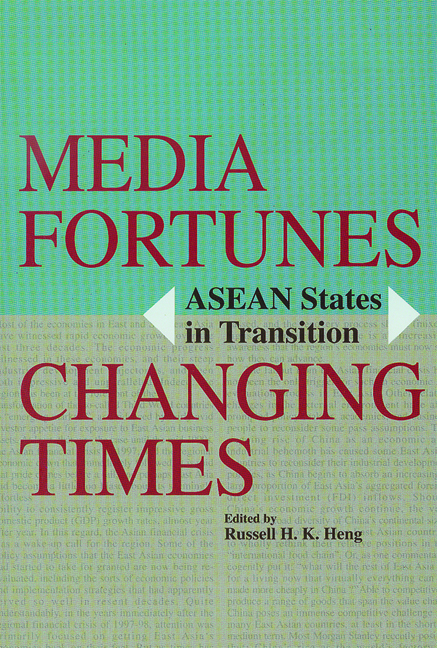Book contents
- Frontmatter
- Contents
- Foreword Wolfgang Möllers
- Acknowledgements
- Contributors
- Introduction
- Chapter 1 Media in Southeast Asia: A Literature Review of Post-1980 Developments
- Chapter 2 Cambodian Media in a Post-Socialist Situation
- Chapter 3 Industrialized Media in Democratizing Indonesia
- Chapter 4 Indonesian Television and the Dynamics of Transition
- Chapter 5 The Impact of Economic Transition on the Media in Laos
- Chapter 6 The Media and Malaysia's Reformasi Movement
- Chapter 7 Myanmar Media: Meeting Market Challenges in the Shadow of the State
- Chapter 8 Singapore: Media at the Mainstream and the Margins
- Chapter 9 Offending Images: Gender and Sexual Minorities, and State Control of the Media in Thailand
- Chapter 10 Vietnamese Media in Transition: The Boon, Curse, and Controversy of Market Economics
- Index
Chapter 2 - Cambodian Media in a Post-Socialist Situation
Published online by Cambridge University Press: 03 November 2017
- Frontmatter
- Contents
- Foreword Wolfgang Möllers
- Acknowledgements
- Contributors
- Introduction
- Chapter 1 Media in Southeast Asia: A Literature Review of Post-1980 Developments
- Chapter 2 Cambodian Media in a Post-Socialist Situation
- Chapter 3 Industrialized Media in Democratizing Indonesia
- Chapter 4 Indonesian Television and the Dynamics of Transition
- Chapter 5 The Impact of Economic Transition on the Media in Laos
- Chapter 6 The Media and Malaysia's Reformasi Movement
- Chapter 7 Myanmar Media: Meeting Market Challenges in the Shadow of the State
- Chapter 8 Singapore: Media at the Mainstream and the Margins
- Chapter 9 Offending Images: Gender and Sexual Minorities, and State Control of the Media in Thailand
- Chapter 10 Vietnamese Media in Transition: The Boon, Curse, and Controversy of Market Economics
- Index
Summary
INTRODUCTION
Cambodia has been experiencing a major transition through the 1990s from being run as a one-party socialist state to functioning as a chaotic polity trying to become a multi-party democracy. In such a major transition, many institutions will have to be reorganized and adjust to a new reality. The Cambodian media is one such example. This chapter examines the extent of the changes in state–media dynamics in the last ten years in the areas of media ownership, the law, state management tactics and the role of foreign players.
CURRENT PROFILE OF MEDIA
Freedom of the press is guaranteed under the present constitution of Cambodia and the country has a relatively free press by regional standards. But many print media are prone to publish with little sense of responsibility. This can lead to the government threatening them with suspension or even closure, although the punitive measures of the state are not necessarily linked to irresponsible editorial output. On balance, there is no systematic repression of the press.
Control is tighter vis-à-vis the broadcast media. All television channels are owned by the government or individuals intimately connected with the ruling Cambodian People's Party (CPP), as are most radio stations. This produces a broadcast situation that urgently needs diversity and independence. The level of journalism education among Cambodian journalists is low and so is the quality of most media output. The level of education is not the only factor affecting the product. The country is poor, and consumers have little disposable income; this keeps media advertising revenues low, which depresses journalists’ salaries.
Widespread illiteracy, limited access to the media in the provinces, and little coverage of what happens in the provinces are other concerns. Additionally, the limited transparency and unclear mandates of information officials within the state bureaucracy hinder journalists’ access to information.
POLITICAL HISTORY OF THE MEDIA
Today's media in Cambodia is born out of the country's turbulent postindependence political experience. Before 1953, France, the colonial power, imposed its own restrictive media policy but it also introduced some Western media traditions into the country. After the French left Cambodia, the number of newspapers exploded, with many of them serving as the mouthpieces of different political parties that were jostling for power in a post-colonial situation.
- Type
- Chapter
- Information
- Media Fortunes, Changing TimesASEAN States in Transition, pp. 27 - 46Publisher: ISEAS–Yusof Ishak InstitutePrint publication year: 2002



